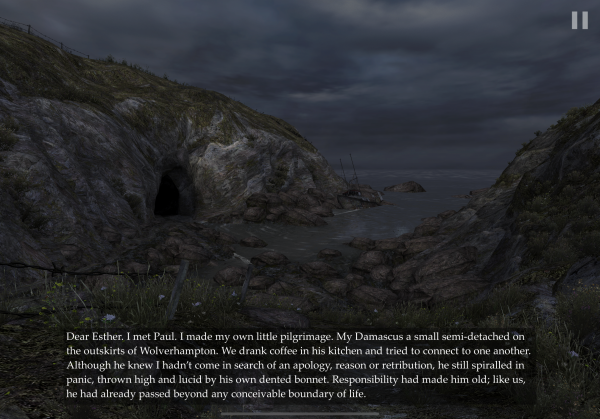Dear Esther review

In coming to mobile, I have finally learned about what Dear Esther is. The game that's often lauded in by more erudite circles of gamers turns out to be both a little more and a little less impactful than expected. There are flashes of brilliance in Dear Esther that are unlike anything else in games, but they're buried in a plodding and formulaic wrapper that is much less impressive.

Walkie talkie
Dear Esther is about a man who wanders and island while telling a tale of regret. You control this man from a first-person perspective and direct him on a very specific path, and he talks at select points along the way. There are no real puzzles, nor can you really interact with the world beyond walking through it.
From the outset of Dear Esther, this man doesn't seem to make a whole lot of sense. He talks about seemingly random things in a disparate fashion. The further you get into the game, though, the more these rambling threads start to come together to tell a tragic story. In this way, the game creates a sort of challenge out of interpreting all of the monologues into a cogent tale.
Isolation island
Beyond walking and talking, not a whole lot happens in Dear Esther. There's no one else on the island, nor is there much of anything for you to do besides walk around it, slowly. These features create a unique tone for Dear Esther, which ends up being both haunting and a bit jarring.
This intentional emptiness and slowness in Dear Esther fits in with the theme of the game and it creates a lot of moments of unexpected, contemplative beauty. Even though the game is seven years old at this point (and looks even older), there are views all over the island that can give you pause. This is especially true if you play Dear Esther with headphones to get the full effect of the game's excellent soundtrack.
As someone playing this mobile version though, I'm sure some of the nuance in this beauty is lost in playing on a smaller screen. Otherwise, this port is fine and has no major technical issues. Checkpoints can feel few and far between, but Dear Esther is a game you'll probably want to (and very reasonably can) play in a single sitting.

Slow burn
Unfortunately for Dear Esther, the slowness of the game is a bit of a double-edged sword. Its pace is so off from what traditional games present that it can be frustrating to navigate. This is especially true if you ever lose your bearings or have to backtrack anywhere. Your character's glacial pace is only an effective tool as long as you're on the right path. Otherwise, it just makes you feel like you're wasting time.
Perhaps more frustrating though is the fact that Dear Esther-in all the ways it seeks to be daring and experimental-ends up telling a pretty boilerplate story. I don't want to get into spoilers, so I'll just say the basic idea of "guy thinks about his past and has regrets" is one of the most common story archetypes and leave it at that. Of course, the way Dear Esther chooses to deliver this story is the real draw, but still.
The bottom line
Dear Esther is a bit of a conundrum. Its extremely slow pace is key to making its tone work, but it can also irritate you to the point that it takes you out of the experience. It also creates an incredibly impressive and intricate set of contrivances to deliver its narrative, but said narrative turns out to be somewhat underwhelming. It's clear that Dear Esther is a special game, and it deserves praise for going so far outside the lines of what games traditionally try to do. But in doing so, it also sets you up for a grand revelation that never really materializes.


















